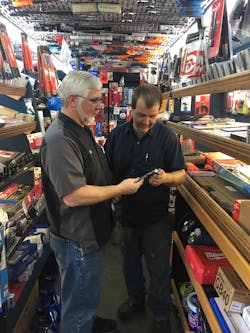In 1993 Jeff Stutts of Asheboro, North Carolina, was working in power line construction when he met a Cornwell Tools dealer looking to get out of the business.
“I was young and eager … so we arranged a deal where I could buy him out. Pretty easy,” Stutts says.
Twenty-five years later, selling tools still seems to come easy to Stutts. His 18’ GMC 5500 series Cornwell Tools truck makes its way through Asheboro and the surrounding small towns and countryside, stopping at auto shops, body shops, salvage yards and the like.
The secrets to Stutts’s easy success? They’re not so secret: “Get your butt up out of bed, go to work, show up on time at every stop … contribute to customers’ needs,” he says. “If they’re looking to spend their money, get their product to them in a timely manner. That’s what makes it work: convenience, time and finance.”
While that strategy for success has remained the same, other aspects of the business have changed drastically in the 25 years Stutts has been selling tools. The biggest change he has seen is the payment methods that customers use.
“In my early years it was 90 percent cash, 10 percent checks,” he says. “Then it kind of went to 75 percent cash, 25 [percent] checks. Nowadays it’s 85-90 percent cards.”
To Stutts, that’s both a blessing and a curse.
“It does make collecting easier,” he says. “You have fees [with cards], but you just absorb them through different means, different measures. It’s not the way I’d do business, but you have to do things differently in business than you’d do yourself personally.”
With his years of experience, advice like this is plentiful from Stutts. It comes in handy when training new mobile dealers, and Stutts has gotten two Cornwell dealers started in the last few months. His advice to new recruits is to get rid of expectations, and instead follow the customer’s lead.
“The biggest thing is not really expecting customers to buy what you think will sell,” Stutts says. “The stuff you think won’t sell will be the thing that does sell. That’s key in the tool business: collections and selling. It’s pretty simple.”
Stutts keeps these principles in mind as he goes about his daily routine. His work ethic is strong, and even after 25 years selling tools, he has no plans to stop anytime soon.
“Until I hit retirement age of either 62 or 65, I’m going to continue digging just like normal,” he says. “As long as I can stay up and going physically, I’m good to go.”



